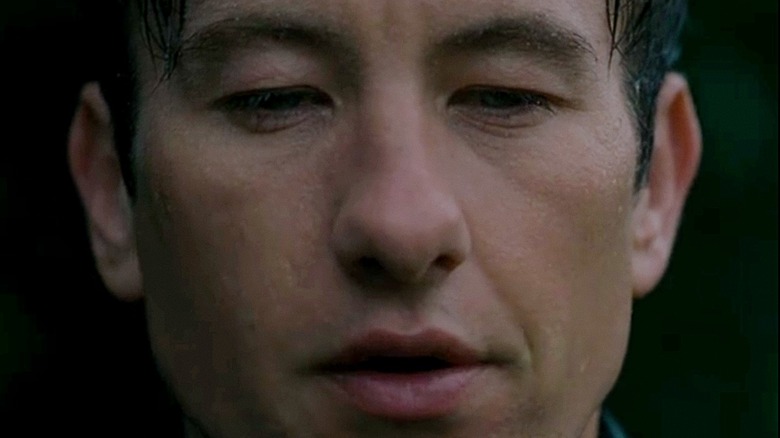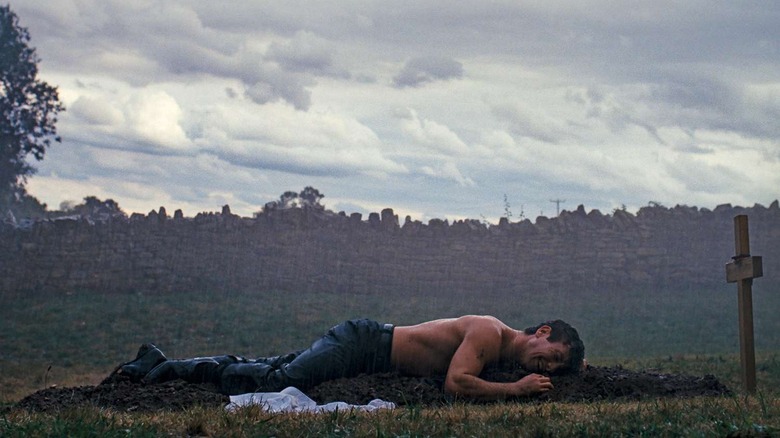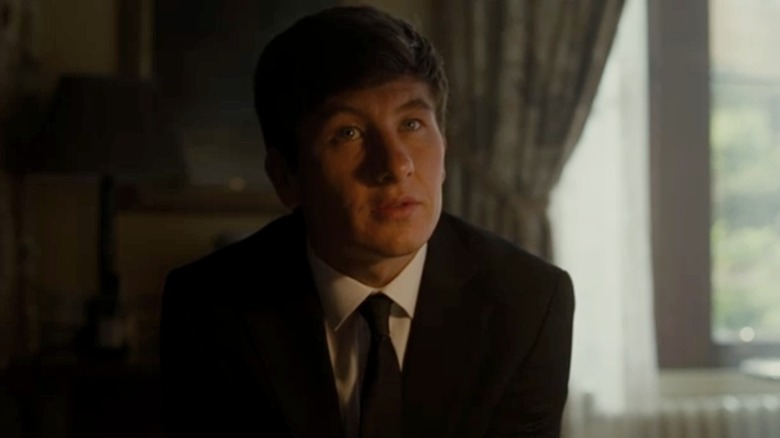One Of Saltburn's Most Riveting Scenes Was Completely Improvised
This article contains spoilers for "Saltburn."
Of all the movies that came out in the final quarter of 2023, it was the psychosexual class thriller "Saltburn" that sparked the most conversation. Sure, the movie's questionable class commentary was kind of interesting, but for the most part people talked about the infamous bathtub scene, or the bloody night-time hookup between Ollie (Barry Keoghan) and Venetia (Alison Oliver). Many have argued that these scenes were for lazy shock value, whereas others have argued that these scenes weren't really that shocking at all.
Either way, these scenes definitely stick with you long after you've left the theater, and the graveyard scene is no exception. This is the sequence where Ollie grieves by the fresh grave of his friend/obsession Felix (Jacob Elordi). The sequence is a long shot of Ollie alone in the rain, crying on the recently-settled dirt. The shot goes on for what feels like three minutes, but within the first twenty seconds or so, when Ollie starts moving his hips a bit on the dirt, everyone in my theater seemed to understand (with absolute dread) exactly what was about to happen.
It's a wild scene: one that makes you disturbed by Ollie's behavior while also being embarrassed for him. The cemetery is a fairly open field, after all, so it's hard not to cringe at the idea of someone walking by and seeing what he's doing. Ollie is gradually revealed throughout the film to have a complicated, years-long plan to steal the Catton family's fortune — a plan that would've fallen apart right here if someone like Elspeth (Rosamund Pike) had come back to check on him. This was a massive potential blunder, so it's not a surprise to find out that it wasn't originally included in the script at all.
A stroke of inspiration
In a recent interview with Variety, Keoghan recalled asking director Emerald Fennell, "Can I have a closed set? I'd like to try something." On paper, Ollie was apparently just supposed to cry by Felix's grave, which would've been a pretty standard grieving scene that wouldn't have ruffled any feathers, but also would've been far less memorable. Keoghan, of course, had another idea:
"I wanted to see what actually happened, where I would take it. I wanted to be confused and let my body lead the way. What am I doing? How can I get closer? It's trying to find that new level of obsession. Trying to level up on the obsession."
It's easy to understand his mindset. Throughout the film, his character is obsessed with Felix in an all-encompassing way. This is all complicated by the fact that Felix is apparently straight, and that their class differences likely mean the two can never make any real relationship work. (Granted, it turns out that the class difference between the two isn't nearly as large as Ollie made it out to be in the beginning, but this reveal only makes the fulfilment of Ollie's desire for Felix even more unlikely.) Now, Felix is dead, and Ollie's desire is fully unattainable. "He's a lost boy who's confused and doesn't know what he's chasing," Keoghan said.
Although the grave sex was Keoghan's improvisation, Fennell still deserves at least some of the credit (or blame) for the results. In an Entertainment Weekly interview, Keoghan recalled how Fennell suggested to him beforehand that Ollie would probably do something along these lines, although she didn't tell him exactly what to do: "She plants seeds, Emerald, you know what I mean?"
Ollie's low point
As confused as Ollie's obsession was in this moment, his motivations going forward became increasingly clear. After Felix's death, Ollie goes right back to his class-climbing schemes, with even more ruthlessness and efficiency than we've seen from him yet. Whereas once he was motivated by an ambiguous mix of lust and money, now it's just for the money.
One can certainly argue that this makes Ollie's actions in the final act less interesting, that his final monologue takes a complex story and oversimplifies it to a straightforward "eat the rich" narrative, but one could also argue that it instead makes Ollie's early actions retroactively more interesting. If Felix had never discovered the truth about Ollie's home life, if Ollie had never felt the need to discreetly poison him to prevent his big secret from getting out, what would have happened instead? Would he still have murdered Felix, just a little later on? Or would Felix reciprocating his love/lust be enough to get Ollie to ease the breaks on this insane scheme of his?
The movie refuses to answer this question, but at least it makes it clear exactly when and where the source of Ollie's desires switched fully to greed. Ollie banging Felix's grave is the closest thing he'll ever get to consummating the relationship, as well as the closest he'll get to closure from that whole affair. "[Ollie] never gets the fulfillment of what he's chasing," Keoghan said. But after this scene Ollie starts chasing something far more attainable than Felix's love, and he does so with far more success.


